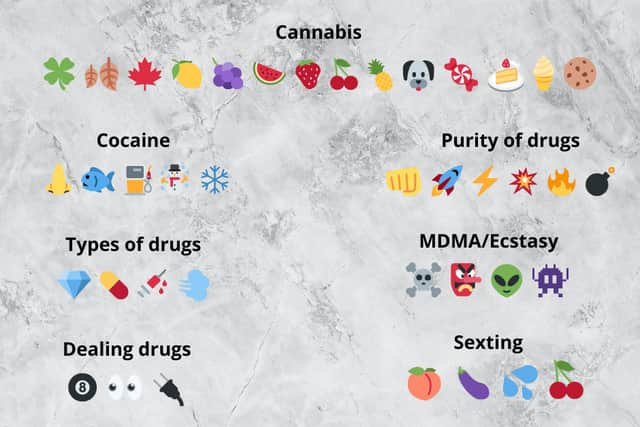Police release guide to ‘secret world of emojis’ for parents - hidden meanings including sex & drug use
Police have published a horrifying guide to the ‘secret world of emojis’ and how innocent looking emojis could in fact be a code for drug use or sex. The force have issued the guide to parents who might be concerned about how their children are using their phones and devices.
The list of examples include using a strawberry, dog, cherries, cake, ice cream or leaves to indicate cannabis. An aubergine or a peach might represent sex and an alien or a mask might mean MDMA.
Advertisement
Hide AdAdvertisement
Hide AdA blowfish, petrol pump or a snowflake can represent cocaine use, while a fist or a rocket might mean how powerful the substances are. Emojis of a pair of eyes or a power cable might mean someone is a drug dealer - while a horse can mean ketamine and a balloon ‘NOS’.
Surrey Police has put out the guide as part of a campaign to make parents more ‘emoji aware’. Detective Chief Inspector Kate Hyder said: “We really want parents and guardians to feel confident to have a conversation with their children about this, if and when they need to."
Emojis - small icons which convey emotion - have become a popular way to communicate across all ages. But Surrey Police say there is a "secret world of emojis" - with "more concerning meanings".
The force said it had spent the last two weeks campaigning to raise awareness, as "some young people may use [emojis] to reference drugs and sexual behaviour".


Det Chief Inspector Hyder added: "Our focus on this doesn’t stop with the end of this initial campaign. We’re also aware that emojis and their alternative meanings are something that will constantly change, and so our work and research into this will continue.”
Police say, although the emojis can have serious meanings, use on their own does not necessarily mean a child is involved in drugs. Instead, this may be seen as part of a bigger picture of a change in their behaviour, such as a change in mood.
A force statement said: "This isn’t a campaign that starts and finishes within this two-week window. Instead, this is about encouraging parents and guardians to have conversations with their children at a time that works for everyone involved.
"What is vital in these discussions is trust. We’re very aware that checking phones could break down this trust between a parent and their child, and therefore we are not suggesting parents do this.
"Instead, we want people to be aware of what these emojis mean, in case they do happen to see them."
Comments
Want to join the conversation? Please or to comment on this article.
